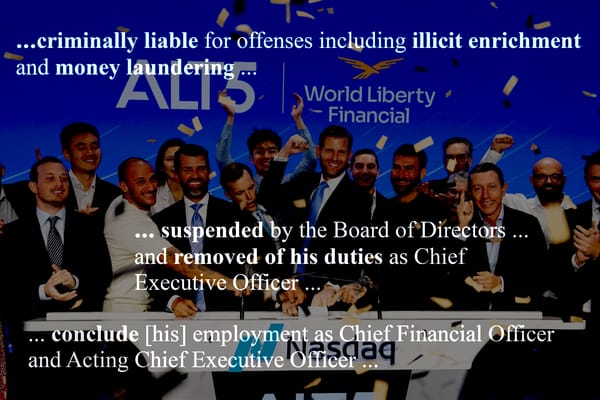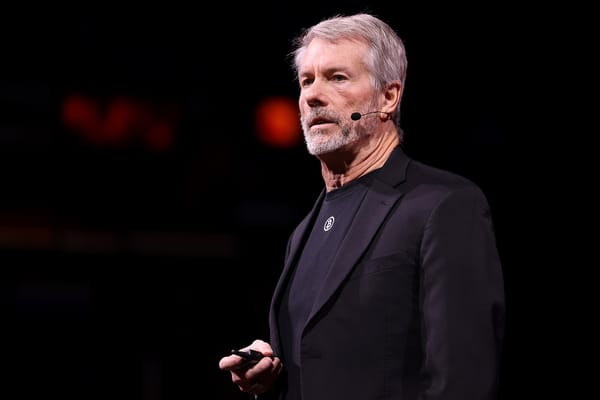Guilty or coerced? Ryan Salame’s last interviews before prison
Unpacking my conversation with FTX executive Ryan Salame, where we discussed his claims that he’s innocent of the charges for which he’s now serving seven and a half years in prison.
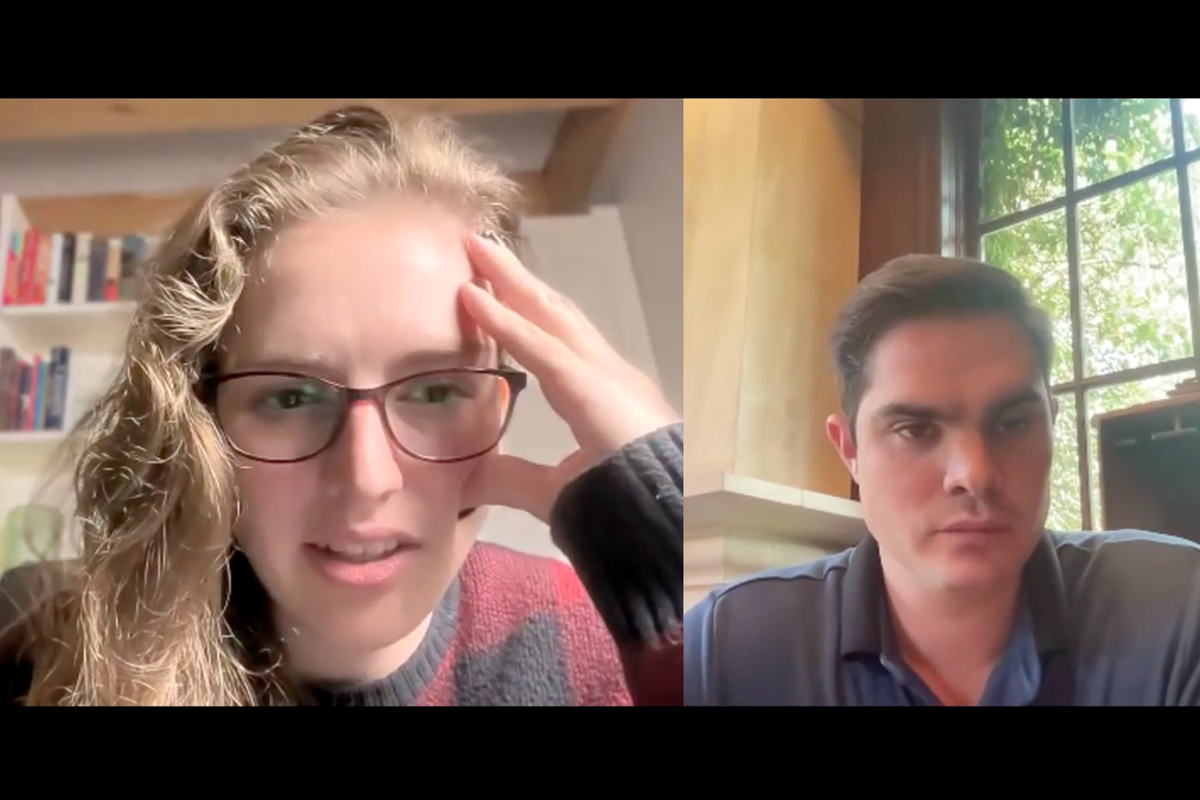

Days before he was due to report to prison to begin a seven-and-a-half year sentence, I gave Ryan Salame a call. I briefly wondered if he had answered from a courthouse, or perhaps a particularly extravagant public library, when his webcam revealed a backdrop of rich wooden bookshelves, a stone chimney, and towering windows. Soon I realized that Salame was talking to me from within one of the last remaining vestiges of his former life as a billionaire executive: a palatial, $4 million estate in Potomac, Maryland that will be long gone by the time Salame is a free man again, surrendered along with his Porsches, a string of restaurants in the Berkshires, and the contents of his bank accounts.

In the wide-ranging conversation, we discussed why he doesn’t feel like Sam Bankman-Fried got a fair trial, why he thinks Caroline Ellison and Nishad Singh lied on the stand, and his claims that he’s about to serve more than seven years in prison for crimes he didn’t commit.
Salame has been very eager to tell his story, particularly now that the threat of being remanded to prison early is no longer hanging over his head. Along with this one, he’s recently done interviews with a motley crew including Laura Shin, DL News, and... Tucker Carlson. I’ll spoil it now, but unlike Tucker Carlson, Salame did not insinuate to me that he was being unfairly persecuted because he’s a Republican. Strange, that.
The “why”
Since the beginning, Salame has insisted that he had no knowledge of the misappropriation of billions of dollars in customer funds that FTX was illegally commingling with company assets and transferring to its supposedly arms-length sister trading firm, Alameda Research. And to be clear, he was never hit with the fraud charges on which the other defendants were convicted, nor did his name crop up much during the trial as those who did steal the money outlined what had happened. Instead, his charges involved campaign finance violations, and failure to obtain the required money transmitting license. But first, we should talk about the fraud.
The central issue at FTX was that customer assets were going in the same pile of money as the company’s own assets, and executives then pulled from this pile to trade at Alameda Research, make venture investments, purchase real estate, take out loans, and spend on advertising and branding deals. When times were good, this didn’t seem to matter — that pile of money was so big, there seemed to be no possible way they might hit the bottom of it. In the early days, after he joined in 2019, “Alameda made just insane amounts of money,” said Salame. “There were just billions and billions of dollars coming in, in actual profit, with a small team.”
Salame quickly became very wealthy, at least on paper, thanks to an early purchase of FTX’s FTT token and some other crypto trades. And although he was originally willing to work 24/7 like many of the other FTX employees, he soon began to feel burned out. He says he tried to resign for the first time in 2019, but both Sam Bankman-Fried and Caroline Ellison urged him not to, with Ellison ultimately convincing him to stay when she pulled him aside and then burst into tears. After deciding to stay, but trying (and failing) to reduce how many hours he was working, he again attempted to resign in 2020 or 2021. This time, he says, it was the lawyers who convinced him to stay. FTX was planning to establish a presence in The Bahamas, which had just come out with regulations that seemed much more favorable to cryptocurrency companies than in other jurisdictions. But in order to be regulated there, the subsidiary would need a CEO who lived there. Rather than retire, the lawyers suggested, Salame could just move to the beautiful island and stay on as CEO in name only. Salame took the offer in August 2021, and he says things were good for a little while. “I’m, like, semi-retired ... just living the life, you know?” He continues, “That’s when I stopped all focus on what the company was doing and day-to-day operations.” The rest of the company was still in Hong Kong, and, as the lawyers had promised, simply living in the Bahamas was about all that the company expected of him. “This was my gift to the company.”
That all changed not long after, when Bankman-Fried visited the island and abruptly decided that he wanted to move the entire company there practically overnight. Suddenly, Salame was working 24/7 again, scrambling to purchase real estate that could house employees, and figuring out the logistics of moving a rather large company to a small island without the infrastructure and amenities to which its employees had grown accustomed. After a few months of this, Salame was burned out again. Fleeing the company once more, this time by moving from The Bahamas to the Washington, D.C. area, he tendered his resignation. This time, he says, it didn’t work out because the timing was bad. Sam Trabucco, once co-CEO of Alameda Research alongside Caroline Ellison, had just resigned. Brett Harrison, the CEO of FTX US, quit not long after. A third resignation, everyone figured, would worsen the types of rumors that tend to crop up when several high-ups all leave a company at once. Instead, he would quietly disappear to the States without publicly announcing his departure.
(I will note that the timing of Salame’s story doesn’t quite line up here — he has variously said he tried to quit for the third time “a few months after” August 2021, or in “early- to mid-2022”. Furthermore, he made an offer on his home in Maryland in May 2022 and closed the sale in early June. All of this points to him likely trying to resign before Trabucco stepped down in August 2022, and certainly before Harrison resigned in late September 2022. Even if he purchased the home before trying to resign, and tried to resign only after Harrison left, most people would not describe October as “early- to mid-year”.)
Anyway, as Salame tells it, at the time he stopped paying attention to what was going on at the company, the company was still bringing in unfathomable amounts of money. But, while Salame regularly claims to believe the other defendants later stole the billions of dollars of customer funds, as charged, he doesn’t always seem to believe it.
[The government] really undercut how much money Alameda made in early ‘21 and ‘20 and ‘19, and how available borrowing was from the largest lenders. And I say that all to mean that there would be zero point to steal customer funds at any point in time, pre-‘21, at least, I don't know what the financials look like post-‘21. But if Alameda needed an extra billion dollars, Genesis would have handed it over in a heartbeat, and so would the other lenders.
There were just so many, sources of almost unlimited money at the time that stealing from customers, there's no reason to do it. I always say, when I talk to people about this, you have to go back to a “why”. I need a “why”. And there isn't a good “why” for a lot of what's been accused. Why did Elizabeth Holmes? Well, the product wasn't working, she didn't want to admit the product wasn't working. That's why. Why Bernie Madoff? He was losing a ton of money, didn't want to admit he was losing a ton of money, so he creates these fake trades and this fake narrative. I mean, everything Sam touched turned to, like, obscene gold. So the “why” has always been very questionable.
Salame never brings up the many “why”s presented at trial: the need to buy out Binance’s $2.1 billion stake in the company at some point during 2021, the market downturn in 2022, the need to repay a slew of Alameda’s lenders who recalled loans in mid-2022 after significant turmoil in the industry, and Bankman-Fried’s apparently insatiable appetite for more and more venture investments.
One thing that became clear to me throughout my conversation with Salame is that he doesn’t seem to believe wealthy people are capable of theft. Salame’s central question around the FTX fraud — why would a person steal customer funds when their company is bringing in billions in profit? — is only one of several along these lines.
Lies on the witness stand
Salame has repeatedly claimed that the trial was unfair, and that the other cooperating defendants were convinced to lie on the stand. Most personal to him are the statements made by Nishad Singh, who also pleaded guilty to a campaign finance charge and implicated Salame as a co-conspirator. “Once he pled guilty to campaign finance fraud it was going to be nearly impossible for me to get up and explain what actually occurred and how it all worked,” Salame says.
Again, he argues that he doesn’t understand why a person would illegally act as a straw donor if they were wealthy and could just donate their own money.
Nishad was worth, I think I estimated $1.5 billion between his crypto holdings, his money that he'd made, his FTX equity. So this is someone who's a billionaire by all intents and purposes. The idea that that person could be a straw donor for someone else to me just seems crazy. Like, why do it illegally when you could just do it legally because you're a multi billionaire? Nishad's argument is he went out of his way to make something a crime that there was no reason for it to be a crime.
When I ask him to describe some of the other lies made on the witness stand, they seem ultimately inconsequential to the outcome of the case. “A ton of mistakes were made, don’t get me wrong. I’m not trying to say these people are all innocent or all these various things,” he again insists.
When I tell him that his tweets have given me the impression that he believes Caroline Ellison was the real mastermind behind the theft, and that she threw Sam Bankman-Fried under the bus, he agrees: “I think that’s fair.” But minutes later, he softens his opinion: “I wouldn’t call her the mastermind, but I think she had a lot more autonomy over Alameda than she’s let on.” His objections with her testimony seem mostly to center around her portrayal of her relationship with Bankman-Fried:
This, like, ‘victim of SBF’s emotional trauma’ or whatever is kind of crazy, right? Like, SBF is the least emotionally available human being I think I’ve ever met in my entire life. If you’re under the idea that he’s developed emotional capabilities with you and then is somehow exploiting them — I don’t think he has it in him physically. I don’t think he could do it if he wanted to. So I think Caroline created this sort of fantasy world in her head, lived in it trying to impress Sam and sort of be at Sam’s mercy, but then also was scared to tell him the truth, tell him what was going on, or indicate to him when there were problems. And then to turn around afterwards and say ‘I was just the victim of Sam doing all this stuff, I wasn’t responsible’... I don’t know. It’s clearly not an accurate narrative, but I can see why it played well, I can see how it helped her a ton.
So, in the end, all of his objections with Ellison’s testimony seem to boil down to his belief that she had a role to play in the fraud, but perhaps not the primary role, and that Bankman-Fried was ultimately responsible. All that to say: the same conclusion reached by the jury.
Salame further insists that Bankman-Fried’s defense team never had the opportunity to tell his side of the story — an argument that very much doesn’t jibe with my recollection of the trial, when said defense team had every opportunity to present a case, yet never successfully did so. As I wrote almost exactly a year ago: “The defense’s difficulty in conjuring a plausible alternative explanation for how these companies collapsed in which Bankman-Fried emerges innocent could simply be because no such explanation exists.”
The inducement
As I’ve discussed previously, most of Salame’s complaints center around allegations that corrupt Department of Justice prosecutors improperly induced him to plead guilty to crimes he didn’t commit, by dangling promises in front of him that they later broke. These promises center around his partner (now wife) Michelle Bond, a crypto advocate in Washington who previously ran for a Congressional seat in New York. Knowing that she was under investigation for campaign finance violations of her own, centering around an alleged sham consulting job at FTX that was just cover for a $400,000 contribution from the company to her campaign, Salame says that prosecutors indicated to his lawyers that they would drop the investigation into her if he pleaded guilty to his charges.
He couldn’t say no to that, he said. “I’d plead to murder to save the mother of my child.” He entered his plea, and it was accepted in September 2023.
But in April of the following year, Salame’s lawyers learned the investigation into Bond was continuing. He says he still held out hope that the prosecutors would honor their promise to him, but when he found out in August that charges were imminent, he filed a petition in his case explaining the promise and asking Judge Kaplan to force the government to either honor the promise, or alternatively, to vacate his conviction. It was too late. The day after his filing, prosecutors filed four charges against Bond, each carrying a maximum sentence of five years in prison.
Salame later tried to withdraw his petition, he says “so Michelle can use the inducement for her purposes, for pushing what she needs forward [in her case]”, but also because he thought it might help counter the government’s argument that he was only submitting the petition because he was shocked at the ultimate length of his sentence. Kaplan forced Salame to come for a hearing anyway, and spent forty minutes questioning Salame about which parts of his plea allocution were untruthful. For this, Salame seems to respect Judge Kaplan, who he’s otherwise not been fond of. “A lot of people were talking about how harsh he was, and how he grilled me for forty minutes. But also I said something like, ‘the whole truth was not laid out in your courtroom’, and that’s something he needs to look into, so I thought he was reasonable.” Kaplan ended that hearing by saying he needed to take time to consider how to proceed, and then did what nobody expected: nothing (at least yet).
As I wrote in that previous issue, there is some evidence that something weird happened in the communications between the government, Salame’s lawyers, and Salame. But according to the government’s contemporaneous notes during meetings with Salame’s lawyers, they were very explicit in May 2023 — months before Salame entered his guilty plea — that “resolution of his case will not bear on her case and investigation of her conduct”.
Responding to my curiosity — and perhaps incredulity — as to why he would risk pleading guilty based on a promise that he didn’t get in writing, Salame explained that prosecutors told his lawyers it was standard practice not to put such a promise into the plea agreement. Skeptical, I asked what his lawyers had to say about this purported promise. “I’ve now talked to so many different white collar lawyers. Some say it's much more common, some say it barely happens, so I don't know how to parse that,” Salame replied. “But what my lawyers did say was that this was the strongest inducement they had ever heard in their 20 plus years either as prosecutors or on the defense council.” Noting that it seemed shady that prosecutors would make promises, knowing he would later be asked under oath during his plea allocution about whether he was pleading based on any outside promises, Salame replied:
No, it's totally shady. You know, everyone's getting into the nuances of words. I don’t know if you read this stuff with Kaplan, but we’re arguing about the specific slight definition of inducement versus promise versus you know, and so the nuance I think comes with... in that case, the way everyone's describing that, is I didn't really... I didn't really lie in the courtroom with Kaplan, it was just that this was stated that it was outside of the agreement, and so I was in there discussing the agreement with Kaplan. So, I wasn’t... we weren't hiding anything, it was just the fact that this wasn't a piece of this formal agreement, but there was this understanding that occurred. You know, everyone's playing with language slightly, and when you get into that level of detail, I think there's already a problem.
Right then.
For context, here’s an excerpt from Salame’s plea allocution:
THE COURT: Has anyone offered you any inducements or threatened you or anyone else, or forced you in any way to plead guilty?
THE DEFENDANT: No, your Honor.
[...]
THE COURT: Has anyone made any promises other than whatever is set forth in the plea agreement that induced you to plead guilty?
THE DEFENDANT: No, your Honor.
[...]
THE COURT: Are you pleading guilty because you are in fact guilty of both of those crimes?
THE DEFENDANT: Yes, your Honor.
Still skeptical after talking to Salame, I asked criminal defense lawyer and former prosecutor Ken White about the promise Salame describes. White replied: “In my experience the feds are extremely careful with this scenario because of its tendency to provoke subsequent collateral attacks on a plea just like this. The feds will either reduce a promise to writing in the agreement and make it clear it’s not an inducement, or refuse to make any promises. At most they will give defense counsel an informal understanding that they don’t intend to pursue a family member.”
White added that such experienced defense attorneys and former prosecutors as Salame’s lawyers would not likely allow an innocent man to plead guilty without raising the argument that the government was threatening punishment against his partner to induce the plea. “If [the government] said anything remotely like that it would be leverage. The more likely explanation is that he’s retconning his plea.”
His charges
When it comes to the charges to which Salame pleaded guilty, his explanation is simple: it’s all the lawyers’ fault.
Salame (perhaps unwisely) stated in his recorded interview with Tucker Carlson that “I had just been at a company that had money transmitting licenses [Circle], so I knew of these licenses and where they were relevant” (despite claiming during his plea allocution that “at the time I was unaware that licensure was required”). He says that because of this, he approached the company’s lawyers to inquire about obtaining a money transmitting license for Alameda Research and/or its subsidiaries, and was informed it was unnecessary. Elsewhere, such as in his sentencing submission, he explains that he believed that the responsibility of obtaining licenses belonged to the company’s lawyers. Honestly, I could see him successfully arguing this at trial — at least if the government doesn’t have evidence up their sleeves proving Salame’s more substantial involvement.
The campaign finance charge is trickier, particularly given evidence that Salame was the person orchestrating all of the wire transfers by various individual executives on behalf of FTX. He explained that this was simply because, “When I was on the settlements team, I had the bank access, and I knew how to send wires, which is actually a little bit more difficult than most people realize, especially internationally.”
But as for serving as a conduit for donations for the company? “I think when you're worth — it is not going to get a lot of empathy, but — I think when you're worth the amount of money I was worth, you don't think about giving money that would not be yours. Like, there'd be no concept of money not being yours. I don't know, it's not like a great statement, but it never crossed my mind that I could be giving money that wasn't mine illegally when there was no need to do it illegally.”
This, of course, contradicts Salame’s own statements to his brother in 2021 that “Sam will route money through me” so that the money would not be traced back to the publicly very Democratic Bankman-Fried family.
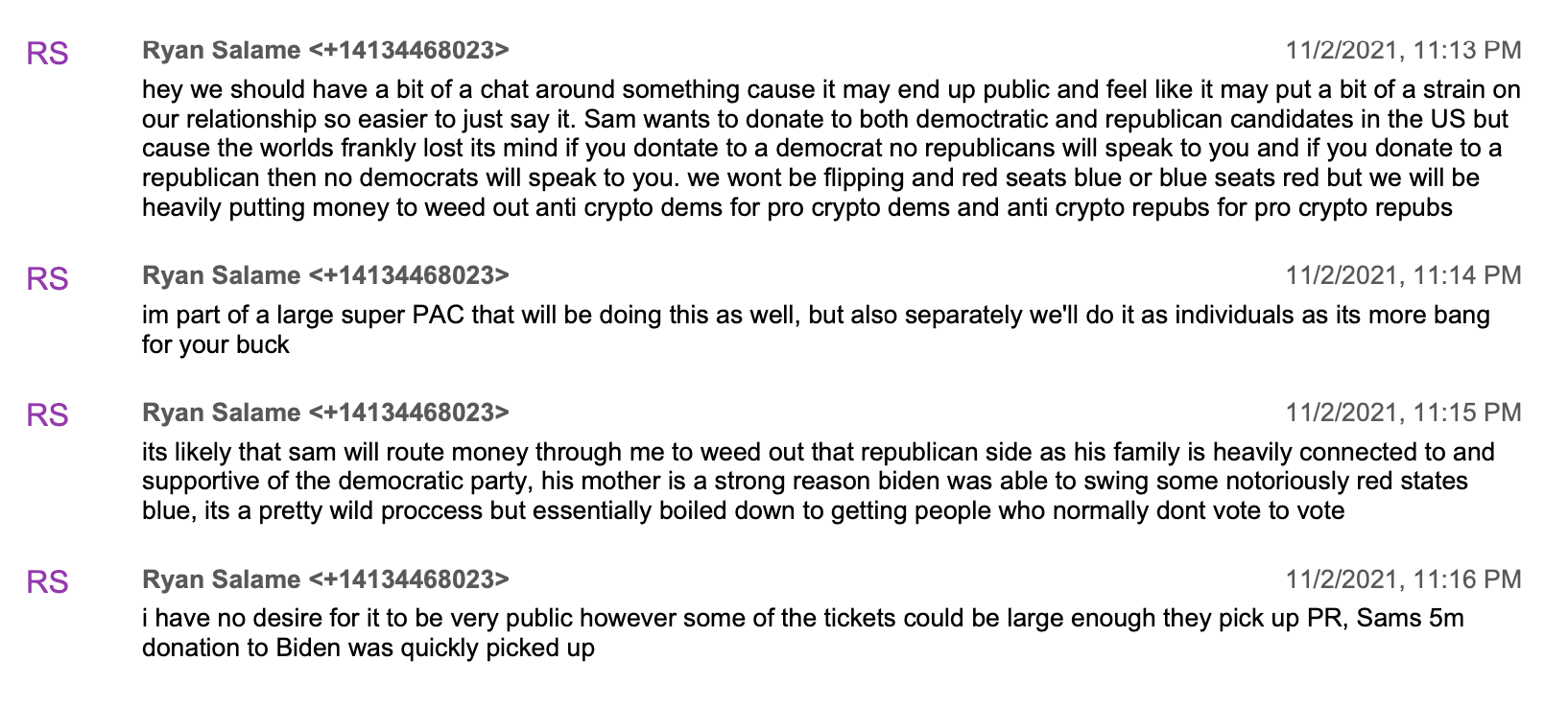
But Salame has an explanation for this too: he says his Republican affiliation has been an issue in the past, and he “needed an explanation for [the donations] and a way to describe that that would sort of allow us to all have Thanksgiving together.” Although he claims that many of his donations to Republicans were in pursuit of pandemic preparedness initiatives, he “knew the pandemic stuff was not going to resonate at all because I had never spoken about pandemics before, and now I was going to become a massive Republican contributor to stop pandemics. That sort of messaging wasn't going to resonate.”
Evidently, it would be easier and less contentious at Thanksgiving if he admitted to federal crimes he hadn’t actually committed, rather than explain his newfound interest in pandemic response — an interest he successfully explained to me rather coherently in the span of a few minutes.
Still, he says, “I obviously regret sending that message now, but I don't regret why I sent that message and what I was trying to do with that message in terms of keeping my family together and keeping happiness and just being able to eat dinner together with my parents and stuff.”
The other interviews
As I mentioned earlier, I was not the only person to interview Ryan Salame. The day before Salame reported to prison, right-wing podcaster Tucker Carlson published an interview with Salame in which he suggested that Salame had been unfairly targeted for prosecution because he was a Republican. “Ryan Salame was the only executive at FTX who wasn’t a partisan Democrat. You can imagine what Biden’s prosecutors did to him,” read the video description.
The video title explained Salame was “facing prison for donating to Trump” — something Carlson chose despite no comment from Salame during the interview suggesting he donated to Trump, nor any record I could find of such a donation.
Carlson: In one sentence, let me tell you the overview from my perspective. Correct me if I’m wrong. Here you have Sam Bankman-Fried, who’s in prison for a long time, but he’s not been charged with any campaign finance violations. He gave to Democrats, he helped Biden get elected. You gave to Republicans, and you’re going away on campaign finance violations. Is that..?
Salame: That’s correct.
Carlson: [Laughing] That’s correct.
Salame did not see fit to point out to Carlson the inconvenient fact that Bankman-Fried was indicted on campaign finance violations (more on what happened to those), nor that Democratic straw donor Nishad Singh was also charged and convicted on campaign finance violations.
The rest of the interview was similarly full of inaccuracies and partisan spin from Carlson’s side, with Carlson at one point suggesting that it was wrong for Salame to have been convicted on the money transmitting license charge because “how can that be a crime?” “If you're getting indicted for not having a US government license to transfer the funds to people who are not US citizens, outside of the United States, like, that's insane. Who would ever imagine that you would be indicted for that? I mean could, I don't know, could the FBI arrest a driver in Abu Dhabi for not having a US driver's license?” Carlson apparently did not bother to read the whopping ten-page-long complaint in which it is explained rather clearly that this is a crime because Salame and FTX were using US banks.
Although Salame went along with Carlson’s narrative for much of the interview, and at various points gamely jumped in with comments to seem to try to please Carlson, he did at least stick to his same general story, and at some points corrected Carlson on major inaccuracies. For example, when Carlson outlined, “You're going to prison soon? For seven and a half years? And there no one's even claiming you were part of the fraud? But this chick who has admitted being part of the fraud is not facing prison?” Salame somewhat meekly noted that, well, Ellison might in fact face prison time. (The interview was apparently recorded before Ellison was indeed sentenced to prison on September 25.)
Salame’s interview with crypto journalist Laura Shin was a much more tolerable watch, primarily because Shin actually has a non-zero amount of knowledge about the case. (I regularly ran into her at the FTX trial last year, and I think she attended more of it than I did.)
What now?
As of October 11, Salame is a resident of FCI Cumberland, where he will stay for some as-yet-undetermined number of years. Though his sentence is seven and a half years, he will be eligible for reductions based on the First Step Act and a drug and alcohol rehabilitation program.
Unlike his former boss, he says he really likes to read, and that he’s actually looking forward to “a little disconnect from the internet”.
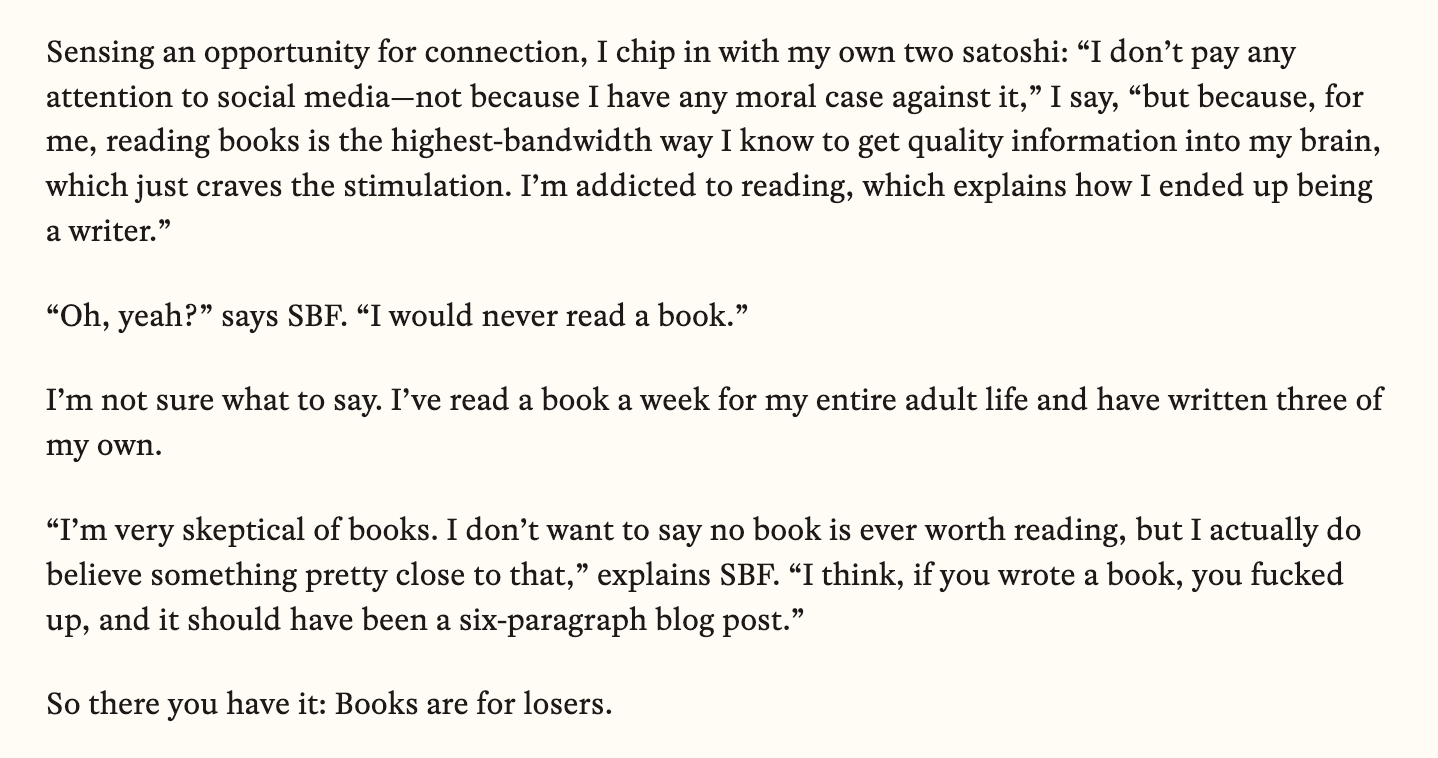
“It’s actually very freeing to be heading to prison,” says Salame.
As for when he gets out? “I’m still allowed to trade crypto markets.”
I have disclosures for my work and writing pertaining to cryptocurrencies.

